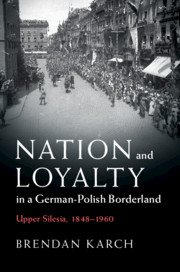Book contents
- Nation and Loyalty in a German-Polish Borderland
- Publications of the German Historical Institute
- Nation and Loyalty in a German-Polish Borderland
- Copyright page
- Contents
- Figures
- Tables
- Maps
- Acknowledgments
- Note on Translations and Place Names
- Abbreviations
- Introduction
- 1 The Battle Before
- 2 Nationalism’s Debut
- 3 Breakdown
- 4 The Weimar Gap
- 5 Reprieve
- 6 The Instrumental Volksgemeinschaft
- 7 The Postwar Ultimatum
- Epilogue
- Bibliography
- Index
7 - The Postwar Ultimatum
Making “Loyal” Poles after 1945
Published online by Cambridge University Press: 14 September 2018
- Nation and Loyalty in a German-Polish Borderland
- Publications of the German Historical Institute
- Nation and Loyalty in a German-Polish Borderland
- Copyright page
- Contents
- Figures
- Tables
- Maps
- Acknowledgments
- Note on Translations and Place Names
- Abbreviations
- Introduction
- 1 The Battle Before
- 2 Nationalism’s Debut
- 3 Breakdown
- 4 The Weimar Gap
- 5 Reprieve
- 6 The Instrumental Volksgemeinschaft
- 7 The Postwar Ultimatum
- Epilogue
- Bibliography
- Index
Summary
- Type
- Chapter
- Information
- Nation and Loyalty in a German-Polish BorderlandUpper Silesia, 1848–1960, pp. 258 - 294Publisher: Cambridge University PressPrint publication year: 2018

